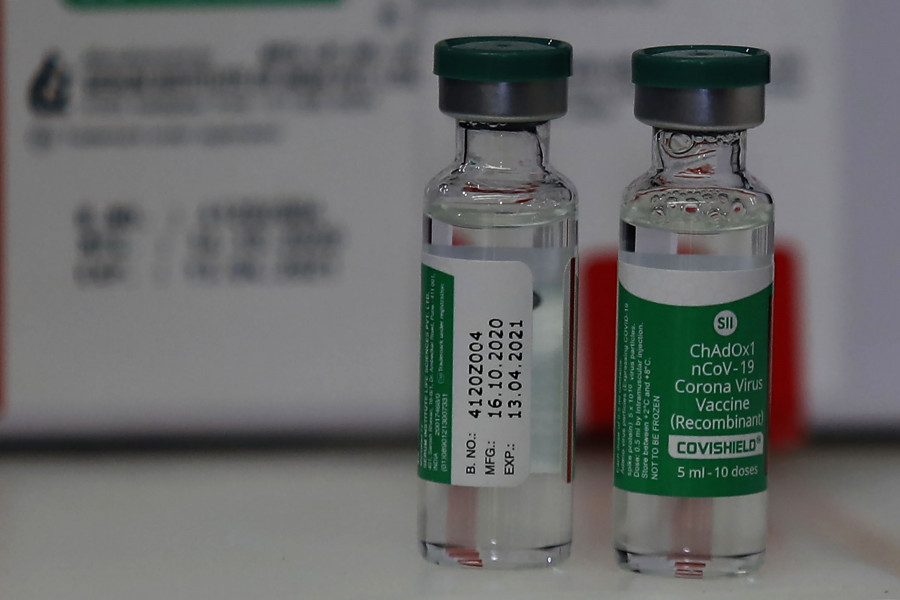Health
Challenges to manage sufficient doses of vaccine for the second phase
Manufacturer has refused to sell jabs at $4, the price Nepal paid earlier, and WHO may not supply vaccines on time. This could lead to shortages for second dose for those above 55.
Arjun Poudel
When Nepal purchased two million doses of Covishield vaccine last month from the Serum Institute of India, it paid $4 per dose. But now the company does not want to sell the vaccine at that price as the demand for it continues to soar the world over.
According to a highly placed source at the Ministry of Health and Population, the company has refused to sell Covishield vaccine directly to the government of Nepal at the price it had sold earlier.
“Due to worldwide demand and limited production, the Serum Institute of India has shown reluctance to sell again at $4 directly to the government,” the source told the Post, asking not to be named. “We have to buy the jabs paying additional amounts through agents of the company.”
With the World Health Organization on February 16 authorising emergency use of Covishield, the global rollout of the vaccine supplies through Covax began and its demand went up.
After the deal to buy the vaccine at $4 per dose was secured, Minister for Health and Population Hridyesh Tripathi had said that the government had been fortunate to secure the deal with the Serum Institute of India at $4.
The price for each dose was $1 more than what the company charged the Indian government.
The Serum Institute of India produces Covishield vaccine, developed by the University of Oxford and AstraZeneca, the British-Swedish multinational pharmaceutical and biopharmaceutical company.
Covishield is the preferred choice of Nepali authorities, as the country’s existing system supports storage and supply of the vaccine.
Given the importance of securing the vaccine, the Cabinet had changed the payment guidelines to allow 80 percent payment in advance for the vaccines to the manufacturing company as the existing Public Procurement Act-2015 does not allow advance payment for goods and services the government procures.
The company has already supplied one million doses and officials say another million doses will arrive soon.
“It will be difficult to purchase the same product at a higher price,” the Health Ministry source said. “The government has to clear the legal hurdles to pay an additional amount to the same product.”
According to the Public Procurement Act-2015, there must be an open bidding for procuring items worth over Rs2 million and it also prohibits the purchase of goods by paying more than what was paid earlier for it.
The Health Ministry has already requested the Serum Institute of India to sell additional five million doses of vaccine, which it plans to use for the second dose that must be administered 8 to 12 weeks after the first one.
The government started the first phase of immunisation on January 27 with the one million doses of Covishield provided by India under grant assistance. Of the one million doses provided by India, over half a million doses are in stock and their expiry date is April 13.
Ministry officials say that they are awaiting the response from the company on the request to sell the five million doses.
Meanwhile, the Health Ministry is preparing to start the second phase of immunisation from March 7 to inoculate all those over 55 years old. It is estimated that 3.7 million people of the said age group have to be immunised.
Besides the Covishiled vaccine, the Department of Drug Administration has also granted emergency use approval to a BBIBP-CorV vaccine developed by the Beijing Institute of Biological Products Co Ltd (BBIBP) in China under Sinopharm and China is giving 800,000 doses of this vaccine in grant.
But officials say Nepal cannot afford to buy the vaccine produced in China as they estimate it will cost much more than Covishield. The Health Ministry had earlier budgeted Rs 48 billion to inoculate eligible Nepalis, estimating each dose to cost $10 which includes management and transporting costs.
To further affect Nepal’s vaccination plans, the UN health agency, which in early February had forecasted to provide 2,256,000 vaccine doses under the COVAX facility by the end of the month, recently said that only 380,000 doses will be supplied in the first phase.
“We have been trying to procure an additional five million doses,” Dr Samir Kumar Adhikari, joint spokesperson for the Health Ministry, told the Post. “We will buy one million additional doses within mid-April and additional four million after then.”
Dr Shyam Raj Upreti, coordinator of Covid-19 vaccine advisory committee, concedes that arranging sufficient doses of vaccine is a challenge at present.
“We cannot rely on the COVAX vaccine for the second dose for those who have already received the first dose since the remaining doses will come in May or even later,” said Upreti.
The Health Ministry said that the second dose of the vaccine will be administered from April 20 to 28 on those who were inoculated in the first phase of the campaign that started on January 27. Likewise, those getting their first dose of the vaccine in the second phase of the inoculation drive will receive their second dose from May 23.
Public health experts say that running the immunisation campaign continuously for months will be challenging.
“Immunisation workers may be exhausted by working for months on end, people also may not be interested in getting the vaccine,” said Dr Bikash Lamichhane, former director at the Child Health Division. “A massive awareness campaign is needed to take people into confidence and clear the rumours about the vaccines.”




 13.12°C Kathmandu
13.12°C Kathmandu















